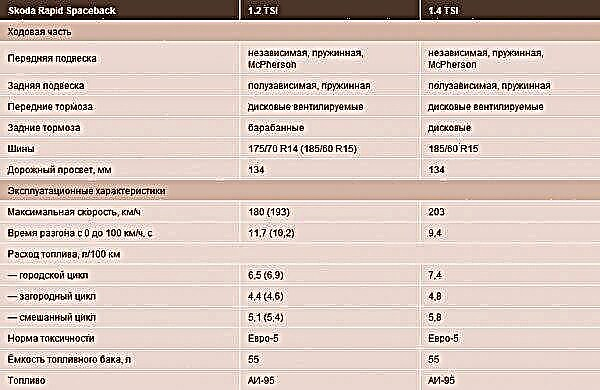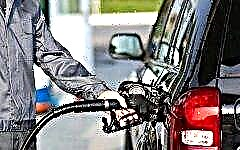

The content of the article:
- The fight for fuel cleanliness
- From a tank farm to a gas station
- Expected Result
In January 2018, the State Duma approved a new law providing for penalties for the sale of low-quality fuel at gas stations. They will be calculated as a percentage of the refueling revenue for the past year and will depend on the frequency of offenses.
The fight for fuel cleanliness

The start for work on the law was the global inspections of gas stations by Rosstandart, which took place in 2015. Their results were terrifying - every fifth station refueled vehicles not only with inadequate fuel, but simply hazardous to the environment and the car.
Such a product is obtained at oil depots by mixing normal fuel from a large refinery with counterfeit products from a small refinery. This happens because small factories, of which there are more than two hundred in the country, have the opportunity to get away from quality control. If they call their products "export", then they are not subject to technical regulations. And when sent to a gas station, the resulting mixture is completed with a quality passport and a manufacturer's declaration of conformity.
This scheme has been working reliably for decades, and small refineries and tank farms remain unpunished.
The head of Rosstandart explained that the existing amount of sanctions is not comparable to the damage caused by the sale of such fuel. Alexey Abramov is confident that turnover fines will make the owners of gas stations think about potential losses, and therefore choose their suppliers more carefully.
Although initially it was about draconian measures in the form of a punishment in the amount of 10-15% of annual revenue, the final version of the law included a figure of 1% in the case of the first violation and 3% after the second detection of counterfeit. Even if we take the approximate turnover of an average gas station, which fluctuates between 50 million rubles and more, then such fines will significantly replenish the state treasury. In addition, an unreliable gas station that tries to sell a low-quality product a second time may receive a notice of suspension of activity for a period of up to 90 days.
At the same time, Rosstandart will oblige the tank farms to enter in the quality passport mandatory information about the tests of the fuel sold, carried out in an accredited laboratory. Despite the fact that each tank farm is responsible for the final composition of the supplied product, as practice shows, in reality it simply stores the imported fuel.
Thus, the release of products with the attachment of only the factory accompanying documentation is not legal. A tank farm may not store fuel properly, be unable to separate different types of fuel, or mix or dilute it for illegal purposes. Therefore, when sending fuel to a gas station, it must confirm its quality and composition with an appropriate document.
From a tank farm to a gas station

Oil depots daily receive several different brands of gasoline, as well as diesel fuel. Even received from different suppliers and factories, it ultimately merges into single tanks, dividing only by octane number. If necessary, performance-enhancing additives are added at this stage, which will then allow the fuel to be marketed as “improved”. But they should not fundamentally change the characteristics of the liquid and its octane number, which is illegal and contrary to technical regulations.
Quality control in a laboratory accredited by Rosstandart will cost the oil depot about 20,000 rubles for 700 tons, therefore, not everyone will agree to strict observance of the new requirements. Fortunately, any document with any conclusion and the "necessary" seal can be purchased at a significantly lower cost.
Expected Result

Alexey Abramov, head of the Federal Agency for Technical Regulation and Metrology, reports that the issue of turnover fines has been worked out very carefully. The Agency received detailed calculations of the activities of various filling stations located in different regions and settlements, with different tariffs, population density and traffic. Only after that was a unanimous decision made not about extremely high fines, but about receiving a percentage of the proceeds.
Criminal legislation has many examples of large penalties that make some types of crime economically unprofitable. Therefore, they decided to adopt this experience in the context of administrative practice. Negotiable fines should be an optimal tool for use in a wide variety of areas of activity where there is a possibility of the appearance and distribution of counterfeit products.
From the point of view of entrepreneurs, the new legislation will significantly increase the burden on their business, which will increase the cost of the final product. Although, in fact, the cost of laboratory quality testing will increase the cost of a liter of fuel by no more than 3 kopecks. Therefore, the tightening of requirements will in no way infringe on the interests of businessmen, unless the entrepreneurs themselves pursue illegal goals.
As a rule, non-network stations sin with low-quality fuel, since respectable gas stations will not risk their reputation because of dubious profits. For private gas stations that have surrogate fuel, fines will hit seriously and very painfully, leading to the closure of an unprofitable enterprise. On the other hand, the threat of such a severe punishment may just lead to greater responsibility of entrepreneurs for the product being sold.
According to the latest expert estimates, the turnover of low-quality fuel in Russia reaches 10 million tons, and this is despite Rosstandart's reports that the share of the surrogate is still decreasing every year.
If, according to the results of inspections in 2014 and 2015, violations were found at 42% of filling stations, in 2016 - by 21%, and in 2017 - by 18%.
By the way, those gas stations where surrogate products appear with enviable regularity will receive special labeling from the inspection authorities. Those owners who do not want to receive such a “stigma”, according to officials, will themselves want to improve the quality of their fuel.
The law separately mentions responsibility for the sale of a product that does not correspond to the physical and chemical composition. For violation of labeling requirements and false information about the functional properties of fuel, sellers face a fine of 100 to 300 thousand rubles.
Finally, the tax method is used in the large-scale fight against the surrogate at gas stations. This is especially true for diesel fuel, which is often supplemented with hazardous frost-resistant fractions.
Since 2015, there has been an excise tax on middle distillates - cheap oil products passed off as diesel. This measure has already revealed about 6 million tons of surrogate fuel used in transport. Although the Ministry of Finance and research groups have calculated that at least 7.7 million tons of low-quality diesel fuel circulate on the Russian market annually.
Will the increased liability of entrepreneurs and the payment of turnover fines lead to dramatic changes in terms of the abundance of counterfeit fuel? Yuri Stankevich from the RSPP Committee on Energy Policy and Dmitry Lipyavko from the board of directors of the oil trader "Rose of the World" believe that legislation will be effective only in combination with other state regulatory mechanisms.
An increase in penalties alone will not improve the situation, especially in the presence of “gray” manufacturers who deliberately produce a low-quality product and are not afraid of any punishment.
Additionally, it is necessary to seriously approach the control system, to introduce a ban on semi-finished products obtained from oil refining waste, which subsequently become part of a surrogate fuel.
The Society for the Protection of Consumer Rights announces the numbers of 100,000 cars that are subject to repair every year due to low-quality fuel. And these are statistics only for Moscow and the nearest Moscow region. The reason for this is the so popular additives that change the octane number and turn the 92nd gasoline into the 95th one. Moreover, they are completely openly sold at various chemical enterprises, being partially harmless, but mostly causing serious damage to vehicles.
Stankevich also adds that such a large amount of a surrogate is largely due to the fiscal policy of the Ministry of Finance, which methodically reduced the profitability of the manufacture and sale of fuel. Therefore, now the state authorities, especially the Federal Antimonopoly Service and Rosstandart, which have received additional leverage, should not overdo it in imposing fines.











